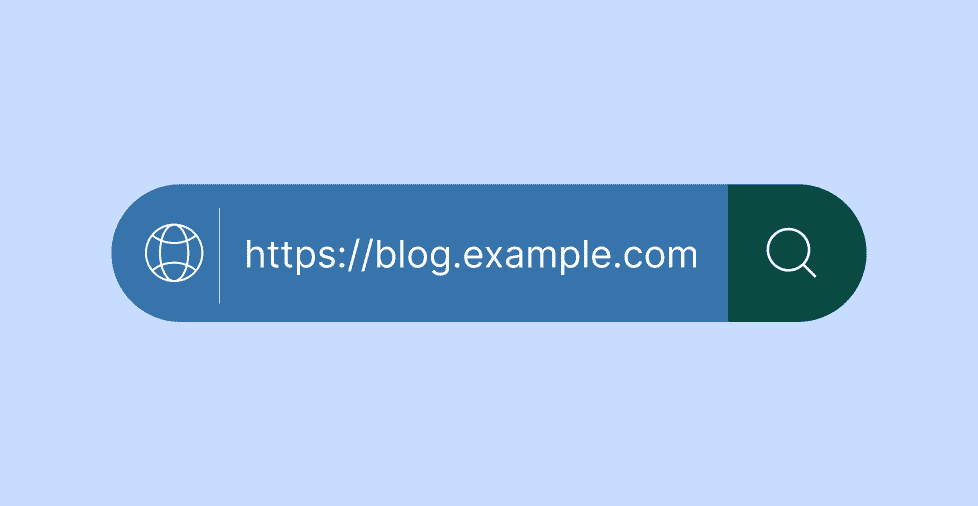Key takeaways:
- Owning a domain name provides full control over your online presence, ensuring your brand remains yours regardless of changes.
- Choosing the right domain name is important for effective brand recall and strong search visibility.
- A domain name is your online identity, which is very important for developing your brand, trust, and searchability on the Internet.
Your branding needs to be strong to establish an online presence, and the best way to do this is to have a solid domain name. A domain name is your unique marker on the Internet, serving as the digital address for anyone looking to connect with you online.
This article will explore why securing a domain name is important, regardless of whether you’re building a personal, eCommerce, or charitable site. We’ll discover what a domain name is, its benefits, who needs one, and how to choose and register the perfect name for your needs.
What is a domain name, and why do you need one?
A domain name is the human-friendly web address that people type into their browser to visit your website. Instead of remembering numbers like an IP address (e.g., 192.0.2.1), people can type something like www.yourwebsite.com to find your site, where “yourwebsite” is the second-level domain and “.com” is the top-level domain (TLD). This system is part of the larger Domain Name System (DNS), which translates those easy-to-remember names into the numerical IP addresses computers use.
While it’s technically possible to not have a domain name (for instance, by directly using an IP address or a subdomain provided by a hosting service), a dedicated domain name is almost always necessary for any online initiative. Without one, it’ll be difficult for internet users to find you online and look unprofessional, like a physical business without a proper street address.
What are the benefits of owning a domain name?
Owning a domain name has many advantages that extend beyond simple accessibility. These benefits contribute to your online success, whether for a business, a personal brand, or a creative project.
Here are the key benefits of owning a domain name:
- Branding and recognition
- Trust and credibility
- Professional email address
- SEO benefits and search visibility
- Portability and control
Branding and recognition
It’s important to choose a relevant domain name that’s easy to remember, since it’s your potential visitors’ first point of contact. Aside from easier brand recall, it also helps with maintaining brand consistency.
Trust and credibility
A custom domain name shows credibility, since websites operating under generic, free subdomains (e.g., yourblog.wordpress.com or yourstore.shopify.com) can appear less professional and less trustworthy to visitors. A dedicated domain name shows you are serious about your online presence, which builds confidence with your audience, customers, or clients.
Professional email addresses
Owning a domain name allows you to create customized email addresses (e.g., [email protected]) for a more polished look than generic ones. For businesses, this reinforces branding and professionalism, while for individuals, it solidifies branding and impression when networking or seeking opportunities.
SEO benefits and search visibility
Choosing the right domain name can influence your search engine optimization (SEO) strategy and how visible you are in search results. A distinctive domain name makes it easier for people to link to your site and share your content, which all helps boost your SEO efforts.
Portability and control
When you own your domain, you’re not dependent on any specific web host or platform. If you switch hosting providers, move your website to a different content management system (CMS), or even change your business model, your domain name remains yours. You retain full control over your online address, ensuring continuity and flexibility for your online presence long-term.
Who should get a domain name?
Anyone with an online presence or planning to build one should get a domain name. Here are some people who should consider getting a domain name:
- Small business owners. A domain name gives business owners a sleek online storefront, which helps customers find their products or services. It helps build trust and credibility to help business owners thrive in a competitive market.
- Bloggers and creators. For writers, artists, or vloggers, a domain name gives you a dedicated hub for your content and portfolio. It allows you to build a personal brand independent of social media platforms, providing a central place for your audience to discover your work.
- Freelancers and consultants. A personalized domain name for portfolio or service websites boosts their professional image. It acts as a professional resume, making it easier for users to find and connect with them.
- Nonprofits, educators, and side projects. A domain name gives credibility and improves reach even for organizations or personal endeavors not focused on direct profit. Nonprofits can use it to share their mission, educators can create online resources, and side projects can gain a dedicated online space to foster a community.
How do you choose the right domain name?
When choosing the perfect domain name, it should be memorable, relevant, and easy to share. Here are two main considerations when choosing one:
- Relevance to your brand or content. Your domain name should relate to your brand or the core content of your website. For example, if you sell artisanal coffee, artisanalcoffeeroasters.com is more relevant than myblogaboutstuff.com.
- Length, simplicity, and clarity. Shorter, simpler domain names are almost always better since they’re easier to remember and type.
When formulating your domain name, avoid these common mistakes:
- Too long or complex. Makes it hard to remember and type.
- Hyphens and numbers. Special characters often lead to confusion and typos. People usually forget to add hyphens or mix up numbers (e.g., “4” vs. “four”).
- Misspellings or obscure words. Can lead to visitors not finding your site or thinking it’s a typo.
- Trademark infringement. Ensure your chosen name doesn’t infringe on existing trademarks to avoid legal issues.
- Ignoring social media handles. Find a domain name with available social media handles for brand consistency across different social media platforms.
- Not checking for similar names. Ensure your name isn’t too similar to an existing brand, which could confuse customers.
If you’re a business owner, make sure to check out our comprehensive guide on choosing a domain name for your business.
Which domain extension should you choose?
Your domain extension, or TLD, can affect perception and trust. Here are some common extensions you can choose from:
- Generic top-level domains (gTLDs): These are the most common type of TLDs. While .com remains the most recognized and preferred choice for businesses and commercial entities, other traditional gTLDs like .org and .net also serve specific purposes.
- Country code TLDs (ccTLDs): Like .uk, .ca, .de, etc., these are specific to countries and are excellent for businesses primarily serving a particular geographic region. They can boost local SEO efforts.
- New gTLDs: Over the past decade, hundreds of generic TLDs have emerged (e.g., .blog, .shop, .app, .tech, .photography). These can be important for niche industries or specific content, which can make your domain name even more descriptive.
How extensions affect perception and trust
Your TLD gives away a hint about your website: a .com usually suggests a commercial intent, while a .org indicates a nonprofit initiative. On the other hand, less common or newer top-level domains (TLDs) might take users a bit longer to process, especially since some have been associated with less trustworthy sites (though that’s becoming rarer these days).
Here’s a table summarizing the pros and cons of common domain extensions:
| Extension | Pros | Cons | Ideal for |
| .com | Most recognized, highly trusted, versatile, good for global reach | Often harder to find available names | Businesses, commercial sites, general use |
| .org | Strong association with non-profits and community organizations | Can be misinterpreted if used for commercial purposes | Non-profits, charities, community groups |
| .net | Generally professional, good alternative when .com is taken | Less recognized than .com, sometimes seen as a “second choice” | Tech companies, network services, and general use when .com is unavailable |
| ccTLDs (e.g., .uk, .ca) | Strong local presence, good for local SEO | Limited international appeal if not applicable | Businesses targeting specific countries |
| New gTLDs (e.g., .shop, .blog) | Highly specific, descriptive, and can be unique | Lower recognition than .com, perception varies | Niche businesses, specialized content, clear purpose |
What is the process for domain registrations?
After choosing your domain name and TLD, you now have to register it. This process is simple and involves two main steps:
- Find out if your domain is available. Use a domain name search tool in domain registrars to type in your desired domain name and see if it’s taken. There are billions of registered domain names, so finding your ideal domain name (that’s also available) can sometimes take a few tries.
- Use a domain registrar. After checking your domain’s availability, you must register it under a domain registrar. Domain registries authorize these companies, such as Network Solutions, to reserve domain names for individuals and organizations. Once you’ve found an available name, add it to your cart, select your domain name registration period (typically 1 to 10 years), and provide your contact and payment information.
For more information, check out our complete guide on how to register a domain name.
Secure your domain name with a trusted domain registrar
If you’re an aspiring entrepreneur, a creative professional, or just starting to make your mark online, it’s always good to have a personalized domain name. With a personal domain name, you can build your online identity and pave the way for future growth.
For trusted domain services, Network Solutions provides various domain registration services for easier registration and management. Network Solutions gives you the confidence to build your online presence with easy-to-use tools and solid support.
Frequently asked questions
While a main domain will do the trick, there are occasions when having several domains can be beneficial, like for protecting your brand or running targeted marketing campaigns.
You can change your domain name later, but it’s generally best to avoid it if possible. Changing a domain name involves registering a new one and then migrating your website, which can be complex.
The “worth” depends entirely on your budget and business goals. A premium domain can help boost your brand recognition and SEO, but it comes at a great cost.
If you fail to renew your domain name, it will eventually expire. Once expired, it enters a grace period where you might still be able to renew it, often with a redemption fee. It will become publicly available for anyone else to register if it’s not renewed within this period.
Technically, you can have a website without a custom domain name. Users will access it via an IP address or a subdomain provided by your web host (e.g., yourhost.com/yourname). However, this is highly impractical for most purposes, as user-friendly domain names are key for discoverability.




